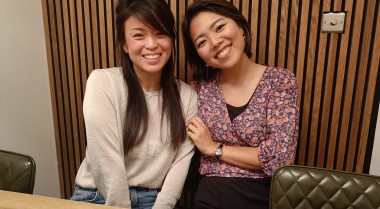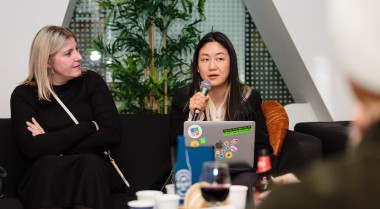
Every voice matters for peace on the Korean Peninsula: Kageyama Yuuka on counternarratives to the military buildup in Northeast Asia
In this series, we highlight the diverse voices of people passionately building peace on the Korean Peninsula as part of the Ulaanbaatar Process (UBP). Named after the Mongolian capital in which it was officially launched in 2015, the Ulaanbaatar Process is a unique civil society dialogue for peace and stability in Northeast Asia (NEA).
This story features Kageyama Yuuka from the Women’s International League for Peace and Freedom (WILPF) Kyoto, who tells us how feminist perspectives can challenge the militarisation of society and expose the threats of military buildup for peace in the region.
Kageyama Yuuka is also active in the International Women’s Network Against Militarism (IWNAM) and GPPAC Northeast Asia. She is a PhD student at the Graduate School of Global Studies, Doshisha University in Kyoto, Japan.
The war is not inevitable
NEA has been facing continuous militarisation and threats of war. How would you describe a militarised society?
Militarism affects every aspect of our life. Our governments rely on the coercive force of authority to solve problems, while our history and culture celebrate strong heroes beating evil enemies.
Militarism encourages us to believe that war is inevitable and that we need a strong military to keep our society safe. Such narratives have normalised continuous preparations for future wars through military buildup with increased military spending.
How can WILPF and other feminist groups challenge military narratives and give an alternative perspective for regional peacebuilding in NEA?
Feminist analysis shows the dominance of masculinity, hierarchy and patriarchy in militarised societies. We show how military spending drains the main resources for our daily life. We need to offer an alternative to the demonisation of North Korea and the rising military tensions between China and the US.
A feminist approach encourages each one of us to consider that there is another way other than military solutions. Feminists make a choice of nonviolence as a way of peacebuilding that enhances gender equality and the well-being of all people.
Counternarrative of feminist and civil society regional coalitions
You are active in WILPF and other feminist networks. Why are feminist regional and international networks important in challenging military narratives?
We have been building feminist networks in NEA and the Asia Pacific, especially in the regions where US military bases are stationed. We exchange information about incidents, assaults, crimes and environmental damage. We show that the military doesn’t protect the lives and wellbeing of people and their environment. Our transnational women’s network gives a counternarrative that war is not inevitable and that military buildup is a threat to everybody.
How did you start to be involved in GPPAC NEA?
That happened through the activities of WILPF Kyoto for dialogue and peace on the Korean Peninsula. WILPF Kyoto hosted a symposium in 2019, where I met very inspiring peacebuilders from GPPAC NEA, who advocated for nuclear abolition, ending the Korean war and demilitarisation. Being a part of GPPAC NEA is a great chance to strengthen the network of civil society against the ongoing militarisation in NEA that only increases tensions among countries in the region.
As a unique platform for civil society organisations in NEA, how can the UBP contribute to peace in NEA?
The UBP is a vital element of peacebuilding in the region. The UBP brings a counternarrative to the official standpoint that tensions and antagonism between the states are inevitable. It shows that dialogue is possible and the only way to decrease tensions. Also, Mongolia’s status as a single nuclear weapons-free state gives hope to civil society that nuclear abolition is possible. The UBP could be a good stimulant to the governments to choose dialogue as a solution rather than antagonism and militarisation in policy making.
This year will mark the 70th anniversary of the Korean War armistice agreement. How do you see the importance of this anniversary?
70 years is such a long time. The war has never ended, and people remain divided on the Korean Peninsula. I don’t want to see it so normalised because it’s not normal! The 70th anniversary will be a great opportunity for us to boost public debate for peace on the Korean Peninsula. We have 70 years of negative history, but at the same time, there has always been strong women and civil society activism to end war and encourage dialogue for peace in NEA.
Are you optimistic about peace coming to the Korean Peninsula?
I do believe that the issue of war and peace is a matter of choice, not an inevitable line of events or the nature of our society as such. We need to think that war or peace is our own choice. Even if we see continuous military buildup and antagonism in the region, there is always a choice we can make. We need to keep saying yes, we can change the situation.
For more reflections on the prospects for peace on the Korean Peninsula, please read the publication issued in September 2022 as part of the Ulaanbaatar Process here: Peace and Security in Northeast Asia – The New Normal?


